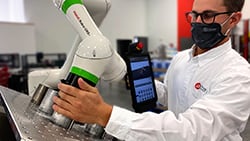
Over the past century, automation has made an immeasurable impact on manufacturing, and it continues to do so to this day. From vast improvements in worker safety to facilitating the 40-hour workweek, manufacturing and industry as we now know them would not be possible without automation.
You may have heard conversations or read articles positing that robots are in the process of replacing human workers, or even that they may one day take over the world. Nothing could be further from the truth. Robots support and augment the work that people do not only in manufacturing, but throughout society, across industries.
Automation robots have made an impact in fields such as medicine, agriculture, finance, ecology, conservation and more. It is clear that, looking at robotic automation and society, the effects have been overwhelmingly positive. Below, we’ll look at some of the benefits of robots in society and the impact they have made.
How can robots benefit our society?
- Increased productivity: Automation enables some of the most repetitive, dangerous, dirty and otherwise undesirable jobs across all industries to be fulfilled by robots instead of human workers. By automating these tasks, robots are able to produce unparalleled quality, accuracy, repeatability and safety — benefits that would otherwise not be achievable thanks to the practical realities of many of these tasks.
- More efficient use of materials: The accuracy and repeatability that automation offers means that there are fewer errors in material usage in processes, and that automated parts and components are subject to less damage and need for replacement. In manufacturing, this equates to less wasted material in production. In areas such as medical and agricultural usage, it means pinpoint accuracy, resulting in longer durability for equipment and components.
- Improved quality: Accuracy leads to better quality, in manufacturing as well as in other fields where automation is used. In any scenario where automation can create more consistency and repeatability, quality — whether in a process or a product — will be improved.
- Increased worker safety: Safety has been an underpinning of automation development since its inception. Automation has long fulfilled the roles that present the most danger to human workers — whether through repetitive motion or risky scenarios. By taking people out of harm’s way and allowing them to focus on more productive areas of production, automation enables multiple benefits.
- Helping businesses remain globally competitive: Automation maximizes the value and production of human employees — allowing them to focus on innovation, strategy and intangibles while robots fulfill the most repetitive tasks. These processes facilitate lower production costs, allowing domestic companies to remain globally competitive while providing exemplary service, quality and reliability.
- Creating new types of jobs: There is an incorrect perception that automation and robots will replace human workers. This is simply false. In fact, automation has created and expanded numerous roles in medicine, agriculture, manufacturing and other industries — creating jobs in robot development, programming and management that previously would not have existed.
At Acieta, we specialize in automation and robotic systems to maximize your resources and production potential. To learn more about our services, contact us today.